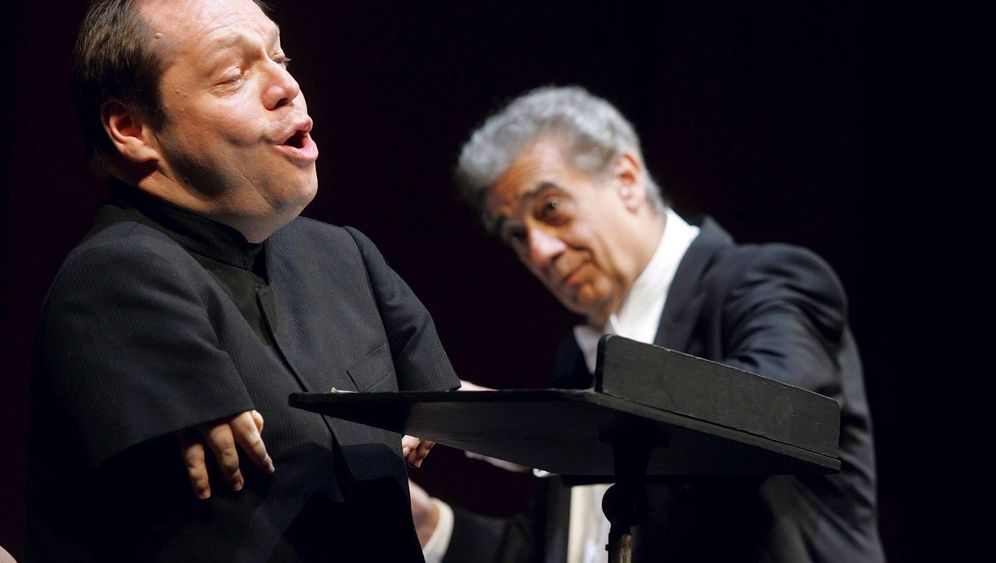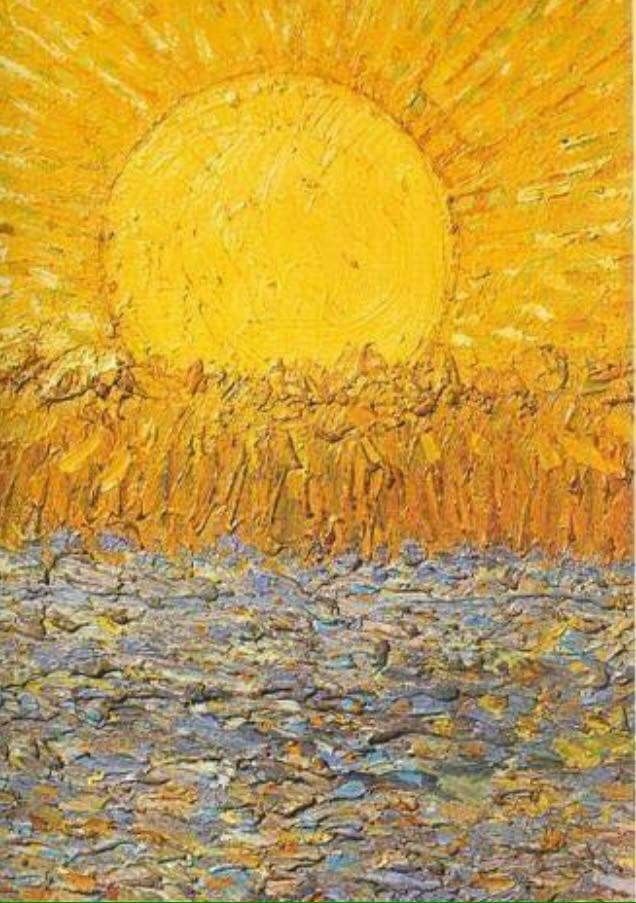

Thomas Quastoff Leona Mitchell
Saturdee Opry Links Overture
Mozart: "La Finta Giardiniera." ("The Pretend Garden
Girl.")
He wrote it when he was 18.
https://en.wikipedia.org/wiki/La_finta_giardiniera
https://www.youtube.com/watch?v=i5pSqbzfddE
1.
Fromental Halévy's opera, "La Juive," ("The Jewess") wrestled with religion
and anti-Semitism way back in 1835. It attracted the admiration of many, including
(later) Gustav Mahler---and Richard Wagner, oddly enough (who "borrowed"
orchestration devices for his own operas.) A heavyweight five-act affair,
the opera was largely eclipsed before the Met revived it in 1919 as a
vehicle for Enrico Caruso. The character, Eléazar, was the last role Caruso
added to his repertoire, as well as the last he ever sang in performance(!),
on December 24, 1920. (He died the following year.) All of which leads us to
the Met "At Home Gala" of a couple weeks ago, and a performance of the
signature Caruso aria from "La Juive"--- "Rachel! quand du Seigneur," by
Jonas Kaufmann---in his living room. Aside from the nobility, sad lyricism,
and power of this aria, and the general angst of it all, I chose this to
lead off today because Kaufmann, I am given to understand, is easy on the
eyes of ladies.
https://www.youtube.com/watch?v=uMLy1wMuXIU
Setting: the Emperor's palace, Constance, Switzerland, 1414
Synopsis: Eléazar's daughter Rachel has been condemned to death by Cardinal
de Brogni for consorting with the Christian prince Léopold. However, Brogni
does not realize that Rachel is actually his own daughter, saved from a fire
in Roman years ago by Eléazar and raised as Eléazar's own daughter. Eléazar
knows he can save her life by revealing this fact, but he is unable to
reconcile his Jewish faith with forcing his daughter to change her faith.
Translation:
Rachel, when of the Lord
Guardian grace
To my trembling hands entrusted your cradle,
I had to your happiness
Dedicated my whole life.
And it is I who deliver you to the executioner!
I had to your happiness
Dedicated my whole life,
And I'm the one who delivers you to the executioner,
And it is I who deliver you to the executioner!
But I hear a voice that cries out to me:
Save me from the death that awaits me!
I am young and I care about life,
O my father spare your child,
I am young and I care about life,
O my father, O my father, spare your child!
Ah! Rachel, when of the Lord
Guardian grace
To my trembling hands entrusted your cradle,
I had to your happiness
Dedicated my whole life.
And I'm the one who delivers you to the executioner,
And it is I who deliver you to the executioner!
And I'm the one who delivers you to the executioner,
Rachel, I'm delivering you to the hangman!
Rachel, it's me, me,
I deliver you to the executioner!
And a word, and a word stopping the sentence,
With a word stopping the sentence
I can save you from death!
Ah! I forever renounce my revenge,
I forever renounce my revenge,
Rachel, no you won't die!
Original French:
http://www.aria-database.com/search.php?individualAria=1178
2.
"Don't cry, Liu," sings Calaf to the adoring, devoted
girl he has rescued from slavery. From Puccini's final opera, "Turandot," I
dedicate this to all who find themselves breaking into tears lately, for no
apparent reason, but having everything to do with the numbing stupidity and
arrogance of the human race. The tenor is the great Placido Domingo (who was
absolved of all charges of harassment and assault by the thorough L.A. Opera-instigated
independent
investigation---after his career was ruined.) The soprano is wonderful Leona
Mitchell.
https://www.youtube.com/watch?v=KJsrxwl3bcc
Setting: The streets of Peking
Synopsis: After Liú begs him tearfully not to risk his
life by playing a deadly game to win the Princess Turandot, Calaf responds
to her gently, asking her not to weep.
Translation:
http://www.aria-database.com/search.php?individualAria=317
SOL EXTRA!
Interview with Leona Mitchell!
https://www.publicradiotulsa.org/post/chat-leona-mitchell-iconic-operatic-soprano-and-oklahoma-state-cultural-ambassador
3.
"Let me weep," sings Almirena, who has been abducted
and imprisoned by a sorceress in Handel's "Rinaldo." The soprano is the
superb Joyce Di Donato---who, I have it on authority, is a wonderful,
kind-hearted, down-to-earth, unpretentious person. Which, these days, is about enough to make one weep.
https://www.youtube.com/watch?v=oJJnhp2CYnk
Setting: a garden in Argante's palace, Jerusalem,
Palestine, during the Crusades
Synopsis: Almirena has been abducted by the sorceress
Armida and imprisoned in the palace. She laments her fate.
Translation:
https://www.opera-arias.com/handel/rinaldo/lascia-ch%27io-pianga/
4.
A little song from Robert Schumann's song-cycle,
"Dichterliebe" ("Poet's Love.") This is "Im Wunderschonen Monat Mai," or "In
the Wonderful Month of May." If only it was. . .one wonders if it will ever
be again. . .literally or figuratively. The tenor is, again, Jonas Kaufmann.
https://www.youtube.com/watch?v=IZ-cCZklhac
Translation:
https://www.oxfordlieder.co.uk/song/830
5.
"Der Leiermann," by Schubert, from his song-cycle, "Die
Winterreise," or "The Winter's Journey." This is "The Hurdy Gurdy Man," a
setting of a poem by Willem Mueller. I feel much in common with the man. Do
you? The baritone is wonnderful Thomas Quastoff."
https://www.youtube.com/watch?v=pze4NxCOjg0
No one wants to listen,
no one looks at him,
and the dogs growl
around the old man.
And he lets everything go on
as it will;
he plays, and his hurdy-gurdy
never stops.
Strange old man,
shall I go with you?
Will you turn your hurdy-gurdy
to my songs?
Translation:
https://www.oxfordlieder.co.uk/song/2046
6.
The devil, you say. Well, Old Scratch has it right, at
least in this little song from "Mefistofele," by Boito. What a foul species
we are! The baritone is the great Samuel Ramey. (Yes, you're right---I do
post this often. And still, not often enough!)
https://www.youtube.com/watch?v=WSyV3cjWLWY
Here is the world,
Empty and round.
It rises, falls,
Dances, glitters,
Whirls about
Under the sun,
Trembles, roars,
Creates, destroys,
Now barren, now fecund-
Such is the world.
Upon its huge
And rounded back
Dwells an unclean
And mad race,
Wicked, subtle,
Proud, vile,
Which forever
Devours itself,
From the depths to the heights
Of the guilty world.
This proud
And foolish race,
Amid vanities
And orgies,
Laughs, exults,
Merrily, heedlessly,
Wealthy, proud,
And swells up
On the foul globe!
Of the guilty world!!!
Italian:
https://www.opera-arias.com/boito/mefistofele/ecco-il-mondo/
7.
"Oh my homeland, I shall never see you again!" sings
Aida in the eponymous opera by Verdi, and it seems an apt song for our
country today. This is "O Patria Mia," with the great Leontyne Price.
Setting: The banks of the Nile
Synopsis: It is the eve of Amneris' wedding to Radamès
and Aida has come to the banks of the nile near the temple to meet Radamès.
She mourns her homeland which she will never see again.
https://www.youtube.com/watch?v=RQ_l2-NBg0w
Translation:
http://www.aria-database.com/search.php?sid=25fb5ed1452dd1dcc985a921484665a7&X=3&individualAria=6
8.
With the completely insane "re-opening" of everything---sure to
make the Pandemic much worse---Korngold's fine opera, "The Dead City" comes to mind. ("Die Tote Stadt.")
Yes, Eric Wolfgang Korngold, who did many a Hollywood score, from "Robin
Hood" to "The Sea Hawk." This is the heartbreaking aria, ""Glück das mir
verblieb" ("Joy, that near to me remained") from act one. The soprano is
Renee Fleming.
Synopsis:
The "dead city" in the opera's title is Bruges,
Belgium, identified in the opera with Marie, the dead wife of Paul. At the
start of act 1, Paul confides in a friend the extraordinary news that he has
seen Marie, or her double, in the town and that he has invited her to the
house. She arrives, and Paul addresses her as Marie, but she corrects him:
she is Marietta, a dancer from Lille. He is enchanted by her, especially
when she accepts his request for a song, "Glück das mir verblieb". The words
tell of the joy of love, but there is a sadness in it also because its theme
is the transitory nature of life.
https://www.youtube.com/watch?v=cVlyymK8vLI
Translation:
http://www.aria-database.com/search.php?individualAria=844
9.
A sentiment that I suspect many of us share. . .Here is
"Torna ai felici di" from Puccini's early opera, "Le Villi." "Bring back the
happy days. . ." The tenor is Placido Domingo, way back in 1968.
Setting: A town in the Black Forest during spring
Synopsis: Anna has been killed by fairies that were
conjured by a witch that seduced Roberto when he was away in Mainz. However,
he does not find this out until after it happens. Roberto is filled with
remorse at letting himself be seduced by another woman and is shocked to
find out that his true love is now dead at the hand of the same witch.
https://www.youtube.com/watch?v=_MPwGE9Thz8
Translation:
Returns to those happy days
When May was gay with flowers
And love blossomed for me!
Then everything was blackened
By lugubrious mysteries,
And now in my heart there is
Naught but sadness and terror!
Perhaps she still lives!
(he looks at Anna's house, hesitates, then walks towards it)
I shall knock!
(about to knock, he steps back as though restrained by some mysterious
force)
What a shudder ran through me!
I could not lift
My hand to her door!
ITALIAN:
https://en.wikipedia.org/wiki/Torna_ai_felici_d%C3%AC
FINAL BOW:
End of the world? One hopes it is, at least as the
world has been in recent decades. This organism is now reaping the reward of
overpopulation, usurping, rampant butchering and despoiling of this one-time
paradise. And the "gods"---our leaders (term used advisedly)---have blown
it, just totally blown it. Willfully and arrogantly, to boot! Plenty more
"reward" to come---even if dire efforts are miraculously made to correct
"our" errors. Well. In Wagner's "Der Ring des Nibelungen," Brunhilde knew how
badly the gods had loused up, and used all her moral courage to put
them---and the world---out of misery. This is the end, "Brunhilde's
Immolation," in which she destroys the world (in this production, depicted
with sort of obscure French---Patrice Chereau---symbolism.) The music is
off-the-scale wondrous. In this staging, the humans wind up standing around,
stunned, amid the ruins. Or is there suggestion of hope, of things starting
again? Will "we" have such a chance? I think not. The soprano is the great Gwyneth Jones.
https://www.youtube.com/watch?v=2JgMt8GWdyU
SATURDEE OPRY LINKS ENCORE!
Okay, kids, as your reward for struggling along with me
today, posting links reflective of my apocalyptic state of mind (entirely
warranted, I say), here is a little absurdity for you. This is the endearing
pop tenor of the past, Carlo Buti, with a sunny song about. . .the sun. You
remember the sun. It's where we used to get our vitamin D, and a great deal
of joy. Excerpt:
https://www.youtube.com/watch?v=ULdNiQGkJKg
Italian and English (for those who want to sing along.)
You, you do not deceive me, golden sun
you caress me with colors
You are good
You, who breath my breath
You can soothe every pain
You are a companion
Ah ah, blooming of these plants
keeps this heart in celebration
do you know why?
I want to live so
With the sun on my face
And I sing happily
Blissfully!
https://lyricstranslate.com/en/voglio-vivere-cosi-i-want-live-so.html-0




